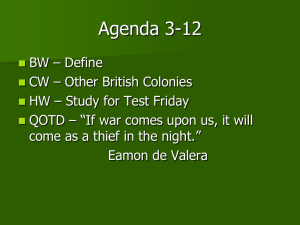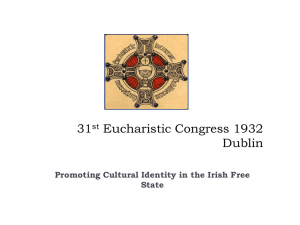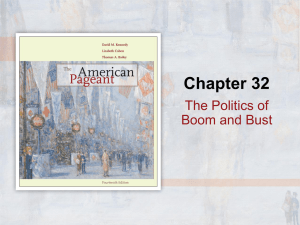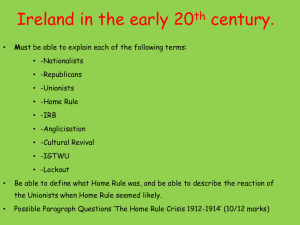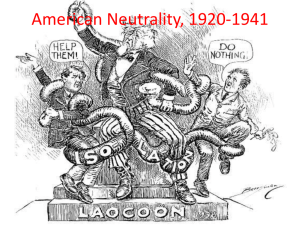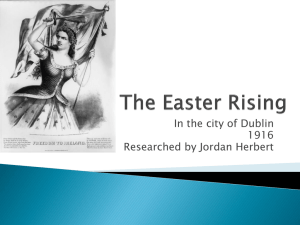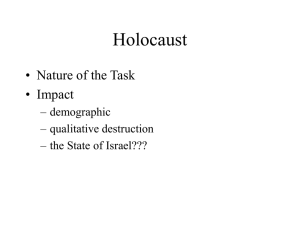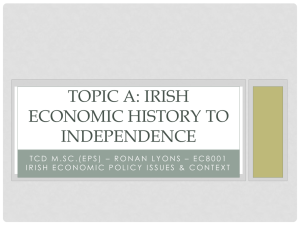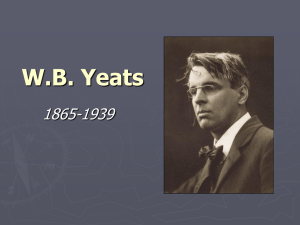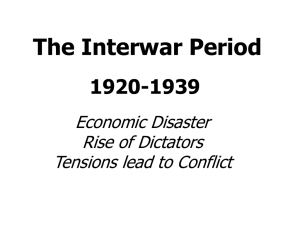`Dismantling the Treaty` & Neutrality 1932 – 1948
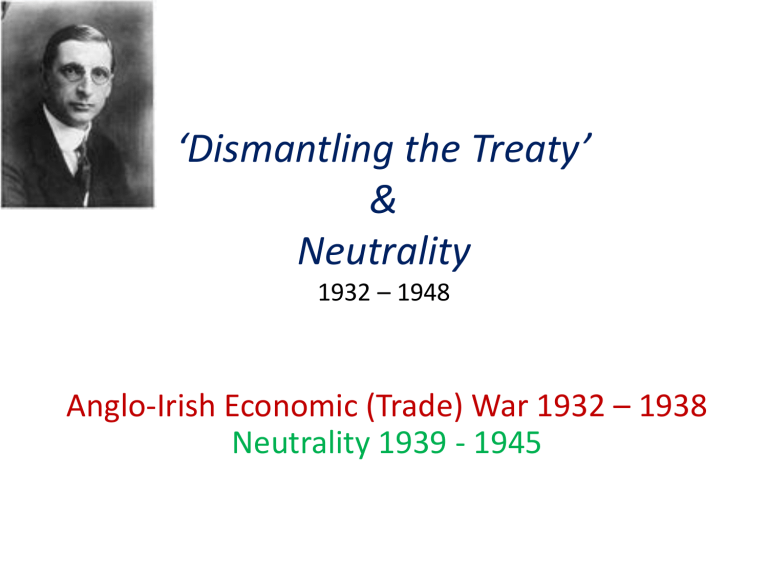
‘Dismantling the Treaty’
&
Neutrality
1932 – 1948
Anglo-Irish Economic (Trade) War 1932 – 1938
Neutrality 1939 - 1945
Fianna Fáil – ‘Dismantling the Treaty’
Anglo-Irish Policy 1932 - 1948
• Anglo-Irish Economic (Trade) War (1932 – 1938) :
DeValera withheld Land Annuities payments; British responded by placing tarriffs on Irish exports to Britain.
DeValera did likewise to British exports to Irish Free State:
• Constitution Amendment Bill (1936) & External
Relations’ Act (1936): With the abdication crisis of King
Edward in 1936, DeValera introduced these acts to remove all reference to the King from Irish Statute books
& move the Irish Free State to an ‘External Association position in relation to the British Commonwealth
• Bunreacht na hEireann (1937 ): DeValera introduced & successfully passed the new constitution of the State, now known as ‘Éire’
• ‘Emergency’ (1939 – 1945) DeValera adopted a policy of
‘Strict Neutrality’ throughout the Second World War
Eamon deValera
President of the Executive Council
1932 – 1937
Taoiseach of Éire
1938 - 1948
‘Dismantling the Treaty’
Diminishing the Role of the Governor-
General (1932 - 36)
External Relations’ Act
(1936)
Removing the
Oath of Allegiance
(1932)
Withholding the
Land Annuities
Payments (1932)
Bunreacht na hEireann (1937)
Anglo-Irish Economic War (1932 – 1938)
Anglo-Irish Trade
Agreement (1938)
Diminishing the Role of the
Governor-General
The Governor-General
• James MacNeill insulted progressively by Fianna Fáil
Government members.
• MacNeill resigned & was replaced by Domhnall Ua Buachalla . Ua
Buachalla, a Fianna Fáil man, never performed any public duties.
• UaBuachalla did not occupy the
Governor-General’s residence and remained hidden from public view until the position was deleted by the Constitution Amendment Act
(1936)
The Oath of Allegiance
Removing the Oath of Allegiance
• DeValera was determined to undermine and delete any reference to the King of England, but had to do so within the restraints of the Statute of
Westminster (1931)
• DeValera, who referred to the oath as a “relic of medievalism” quickly introduced a Bill to remove the aoth on 22 nd March
1932. It was delayed by the
Cumann na nGaedhael-controlled
Senate until it passed in 1933.
“I ................ do solemnly swear true faith and allegiance to the
Constitution of the Irish Free
State as by law established, and that I will be faithful to
H. M. King George V., his heirs and successors by law in virtue of the common citizenship of Ireland with
Great Britain and her adherence to and membership of the group of nations forming the British
Commonwealth of Nations.”
Withholding the Land Annuities’ Payments
1932 - 1938
Land Annuities:
• DeValera was determined to withhold the Land Annuities’
Payments from the UK as agreed under the Anglo-Irish Treaty
(1921)
• DeValera imposed duties on foreign imports into the Irish Free
State, most of which were British.
The British did the same to Irish exports to Britain, thereby starting the Anglo-Irish Economic
(Trade) War (1932 – 1938)
Further Measures:
Governor-General & Privy Council
• DeValera removed the
Governor-General’s power to withhold consent from
Parliament Bills
• British attempted to block this move by bringing a case against DeValera to the Privy
Council
• DeValera also removed the right of an Irish Free
State citizen to appeal to the Privy Council, the highest court of appeal within the British
Commonwealth
• Privy Council ruled that
DeValera was within his rights under the terms of the Statute of Westminster (1931)
DeValera
&
League of Nations
1932 - 1939
DeValera & League of Nations
1932 – 1939
De Valera believed in the power of the League of Nations to protect, especially, the rights of small nations in the world.
President of the League of Nations Council: 1932
President of League of Nations Assembly: 1938
DeValera & League of Nations
1932 – 1939
• DeValera criticised the League for not being more preventative of crises throughout Europe & the world.
• DeValera & the Irish Free State’s prominent position within the League helped to bolster the Irish Free State’s international recognition, which
DeValera hoped would protect them if relations with Britain became worse.
De Valera supported League sanctions against Italy when it invaded Ethiopia.
De Valera supported non-intervention in the Spanish Civil War, against Catholic bishops who pressed him to recognise Franco .
Coal-Cattle Pact (1935)
• Due to the 20% tariffs on trade between both Irish Free State
& UK, many farmers in Ireland had begun slaughtering their own surplus cattle as they could not be sold
• In a bid to make both cattle and coal affordable again, both the Irish Free State and UK signed the Coal-Cattle Pact
(1935) to lower the protectionist barriers on the sale of these vital exports.
Abdication Crisis &
External Relations’ Act
1936
Abdication Crisis: 1936
When King Edward VIII abdicated in 1936 to marry
Wallis Simpson, DeValera used the opportunity to remove all references to the Governor-
General & the King of England from Irish Statutes:
External Relations Act (1936) :
“....for the purpose of the appointment of diplomatic and consular representatives....the
King...is hereby authorised to act on behalf of Saorstát
Eireann for the like purposes, as and when advised by the
Executive Council to do so.”
Constitution Amendment Bill
(1936):
This removed all reference to the
King & Governor General from the Free State Constitution.
• The King of England now had only the right to sign the appointment letters of
Irish Diplomats
Bunreacht na hEireann
(1937)
Articles of Bunreacht na hEireann
(1937)
DeValera’s new Constitution declared that:
The name of the State was ‘Éire’ or
Ireland
The first official language of the state was Irish
The Head of State was the President, directly elected for a seven-year term
The flag of the State was the Tricolour of Green, White & Orange
The Taoiseach was the head of the
Government
The Dáil & the Seanad were the two
Houses of the Oireachtais
Divorce was made illegal (Article 41)
Articles of Bunreacht na hEireann
(1937): Articles 2 & 3
Article 2
“The national territory consists of the whole island of
Ireland, its islands and the territorial seas.”
Article 3
“
Pending the re-integration of the national territory, and without prejudice to the right of the parliament and government established by this constitution to exercise jurisdiction over the whole territory, the laws enacted by the parliament shall have the like area and extent of application as the laws of Saorstat Éireann [3] and the like extraterritorial effect.”
Malcolm MacDonald:
Secretary of State for Dominion Affairs
(1935 – 1938)
• Malcolm MacDonald, appointed as
Secretary of State for Dominion
Affairs in 1935, met DeValera a number of times to come to an understanding in relation to Anglo-
Irish Relations
• Followed a line of appeasement towards DeValera while maintaining that Bunreacht na hEireann did not alter Ireland’s position within the
British Commonwealth.
• In reality, ‘Éire’ was now a republic in all but name.
Anglo-Irish Agreement
(1938)
Anglo-Irish Trade Agreement (1938)
• Signed between Éire & UK on
25 th April 1938
• 20% tariffs placed on each other’s exports were to be abolished
• £10 million one-off payment by Éire to resolve Land
Annuities issue
• ‘Treaty Ports’ i.e. Cobh,
Berehaven & Lough Swilly returned to Éire
• UK Act returning the Treaty
Ports:
Eire (Confirmation of
Agreements) Act 1938
Impacts of DeValera’s Anglo-Irish
Policy
(1932 – 1938)
• Protectionism & Tariff War had ended Land Annuities
Payments
• ‘Dismantling the Treaty’ had successfully made Eire a republic in all but name
• DeValera’s League of Nations mission had promoted the independence of Éire which would be vital in maintaining neutrality in the coming war
• DeValera had re-balanced the unequal relationship between Eire & UK. He was also keen to normalise relations between the two countries before the impending conflict in Europe broke out. Good
